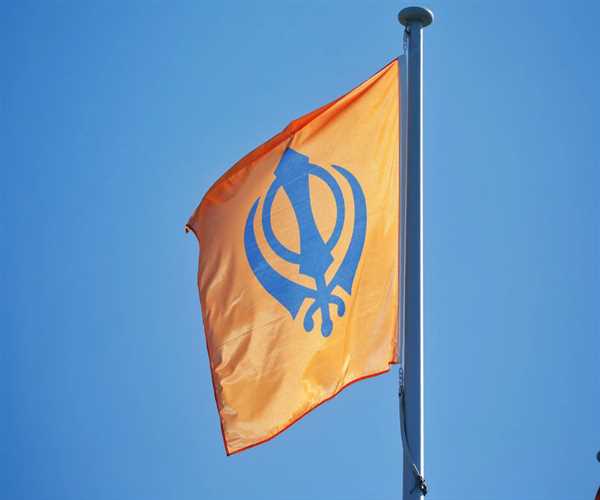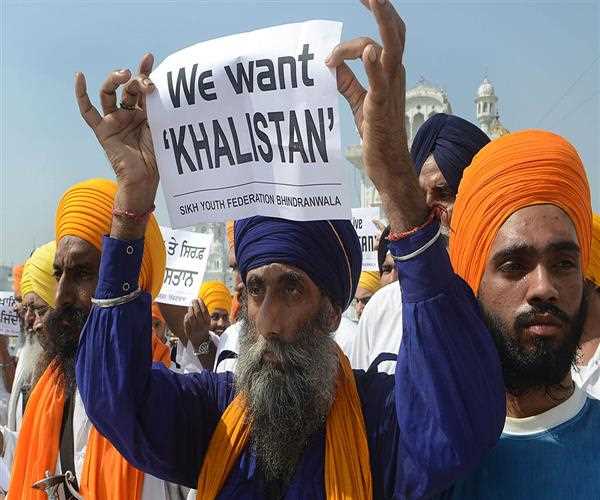
19-Jul-2023 , Updated on 7/19/2023 4:06:27 AM
Khalistani's are not sikhs- We all know very well
Highlights
- "Khalistanis are not Sikhs: We all know very well" is a statement often made to assert that Khalistanis, who advocate for a separate Sikh state called Khalistan, do not represent the entire Sikh community.
- The term "Khalistanis" refers to individuals or groups who support the idea of an independent Sikh homeland, called Khalistan, typically in the Punjab region of India.
- Sikhs are followers of Sikhism, a monotheistic religion founded in the 15th century in the Punjab region by Guru Nanak Dev Ji. Sikhism promotes equality, peace, and social justice.
- Sikhism has a long history of coexistence with other religions and communities, emphasizing the unity of all humankind and rejecting discrimination based on religion, caste, or ethnicity.
- While some Sikhs may support the idea of Khalistan, it is important to note that not all Sikhs identify as Khalistanis or share the same political aspirations.
- Khalistanis often advocate for their cause through political activism, protests, and sometimes even extremist or violent means. However, it is crucial not to generalize the actions or beliefs of a few individuals to the entire Sikh community.
The Sikh faith is a beautiful and peaceful religion that teaches the importance of equality, compassion, and service to others. However, there is a small group of people who have hijacked the Sikh name and are using it to promote violence and separatism. These people are known as Khalistanis, and they are not Sikhs.
The Khalistani movement began in the 1970s as a reaction to the perceived neglect of the Sikh community by the Indian government. However, the movement quickly turned violent, and there were a number of terrorist attacks carried out by Khalistani militants. In 1984, the Indian government launched Operation Blue Star, a military operation to flush out Khalistani militants from the Golden Temple in Amritsar. The operation was successful, but it also led to the deaths of hundreds of innocent Sikhs.

The Khalistani movement has been largely dormant since the 1990s, but there have been a number of recent incidents that have raised concerns about its resurgence. In 2017, a Khalistani-inspired terrorist attack killed 19 people in Punjab. And in 2022, a Khalistani group claimed responsibility for a bomb attack in New Delhi.
To understand the disconnect between Sikhs and Khalistanis, we must first comprehend the core principles of Sikhism. Sikhism promotes equality, service to humanity, and devotion to God. Sikh teachings emphasize the importance of leading an honest and righteous life, while rejecting any form of discrimination or oppression. Sikh Gurus, spiritual leaders revered by Sikhs, have emphasized peace, compassion, and unity among all individuals, irrespective of their religious or ethnic backgrounds.
Historical Context
The demand for Khalistan emerged during the late 20th century, primarily driven by a sense of political and economic marginalization among some sections of the Sikh community in Punjab, India. This sentiment led to a small faction advocating for a separate Sikh nation called Khalistan. It is crucial to recognize that this separatist movement does not represent the beliefs or aspirations of the entire Sikh community.
It is important to remember that Khalistanis are not Sikhs. They do not represent the Sikh faith, and they do not have the support of the vast majority of Sikhs. In fact, many Sikhs have spoken out against the Khalistani movement, and they have condemned the violence that has been carried out in its name.
The Sikh faith is a religion of peace and love, and it is important to protect it from those who would use it for their own violent purposes. We must all stand together to reject Khalistani ideology and to promote the true message of Sikhism.
Here are some of the reasons why Khalistanis are not Sikhs
- The Sikh faith teaches the importance of unity and brotherhood, while Khalistanis promote separatism and violence.
- The Sikh faith teaches the importance of compassion and service to others, while Khalistanis have been responsible for a number of terrorist attacks.
- The Sikh faith teaches the importance of following the Gurus' teachings, while Khalistanis have rejected the Gurus' teachings and have instead turned to violence.
It is important to remember that the vast majority of Sikhs do not support the Khalistani movement. In fact, many Sikhs have spoken out against the movement and have condemned the violence that has been carried out in its name
We must all stand together to reject Khalistani ideology and to promote the true message of Sikhism: a message of peace, love, and unity.
Here are some things that you can do to help:
- Educate yourself about the Sikh faith and the Khalistani movement.
- Speak out against Khalistani ideology and violence
- Support organizations that are working to promote peace and understanding between Sikhs and non-Sikhs.
Production of Khalistan is an idealistic plan. Wealthy Sikhs living abroad came up with the idea for Khalistan to realize their political goals. In any case, a typical Sikh is least worried about the matter.
The Indian Sikhs are unfathomably venerated for their inventive and battling characteristics. Despite the fact that they are a small community with a population of just 1.70 percent, they are the backbone of Indian defense, making up 24% of brass-rank defense officers and 14% of the Indian Defence Forces. They have imposing business model over Indian vehicle area.
Formation of Khalistan can't be upheld as it won't be in that frame of mind of the Sikhs. No Sikh will jump at the chance to leave his well deserved properties in various pieces of India. In addition, numerous Sikh pilgrimages can be found throughout India. It will be challenging to visit uninhibitedly those journeys in case of making of Khalistan.
Misrepresentation and Stereotyping
Unfortunately, Sikhs have often been victims of misrepresentation and stereotyping, particularly in the aftermath of acts of terrorism committed by individuals wrongly associated with the Khalistani movement. These instances have led to misguided assumptions and generalizations about the entire Sikh community. It is crucial to differentiate between those who follow Sikhism as a faith and those who advocate for a separate political entity.
Condemnation by the Sikh Community
It is essential to acknowledge that the Sikh community worldwide has consistently denounced acts of violence and terrorism perpetrated in the name of Sikhism or Khalistan. Sikh religious leaders, institutions, and organizations have repeatedly spoken out against violence and expressed their commitment to peace, unity, and the well-being of all humanity. The Sikh community continues to work tirelessly to counter the misrepresentation and stereotypes perpetuated by those who mistakenly equate Sikhs with Khalistanis.
In conclusion, it is imperative to recognize that Khalistanis are not synonymous with Sikhs. Sikhism is a religion founded on principles of peace, equality, and social justice. While the demand for Khalistan has existed within a faction of the Sikh community, it is essential to avoid generalizations that unfairly label all Sikhs as proponents of separatism or violence. By understanding the historical context, the peaceful identity of Sikhs, and the denouncement of violence by the Sikh community, we can challenge the misconceptions and stereotypes that continue to plague Sikhs.
Together, we can make a difference and help to ensure that the Sikh faith is not hijacked by those who would use it for their own violent purposes.

SEO and Content Writer
I am Drishan vig. I used to write blogs, articles, and stories in a way that entices the audience. I assure you that consistency, style, and tone must be met while writing the content. Working with the clients like bfc, varthana, ITC hotels, indusind, mumpa, mollydolly etc. has made me realized that writing content is not enough but doing seo is the first thing for it.
Join Our Newsletter
Subscribe to our newsletter to receive emails about new views posts, releases and updates.
Copyright 2010 - 2026 MindStick Software Pvt. Ltd. All Rights Reserved Privacy Policy | Terms & Conditions | Cookie Policy